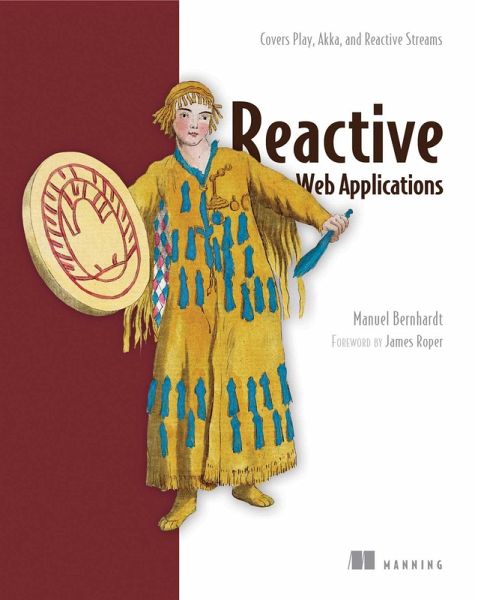
Reactive Web Applications (eBook, ePUB)
Covers Play, Akka, and Reactive Streams
Versandkostenfrei!
Sofort per Download lieferbar
34,61 €
inkl. MwSt.
Weitere Ausgaben:

PAYBACK Punkte
0 °P sammeln!
Summary Reactive Web Applications teaches web developers how to benefit from the reactive application architecture and presents hands-on examples using the Play framework. Purchase of the print book includes a free eBook in PDF, Kindle, and ePub formats from Manning Publications. About the Technology Reactive applications build on top of components that communicate asynchronously as they react to user and system events. As a result, they become scalable, responsive, and fault-tolerant. Java and Scala developers can use the Play Framework and the Akka concurrency toolkit to easily implement rea...
Summary Reactive Web Applications teaches web developers how to benefit from the reactive application architecture and presents hands-on examples using the Play framework. Purchase of the print book includes a free eBook in PDF, Kindle, and ePub formats from Manning Publications. About the Technology Reactive applications build on top of components that communicate asynchronously as they react to user and system events. As a result, they become scalable, responsive, and fault-tolerant. Java and Scala developers can use the Play Framework and the Akka concurrency toolkit to easily implement reactive applications without building everything from scratch. About the Book Reactive Web Applications teaches web developers how to benefit from the reactive application architecture and presents hands-on examples using Play, Akka, Scala, and Reactive Streams. This book starts by laying out the fundamentals required for writing functional and asynchronous applications and quickly introduces Play as a framework to handle the plumbing of your application. The book alternates between chapters that introduce reactive ideas (asynchronous programming with futures and actors, managing distributed state with CQRS) and practical examples that show you how to build these ideas into your applications. What's Inside
- Reactive application architecture
- Basics of Play and Akka
- Examples in Scala
- Functional and asynchronous programming
- Did you say reactive?
- Your first reactive web application
- Functional programming primer
- Quick introduction to Play
- Futures
- Actors
- Dealing with state
- Responsive user interfaces
- Reactive Streams
- Deploying reactive Play applications
- Testing reactive web applications
PART 1 GETTING STARTED WITH REACTIVE WEB APPLICATIONS
PART 2 CORE CONCEPTS
PART 3 ADVANCED TOPICS
Dieser Download kann aus rechtlichen Gründen nur mit Rechnungsadresse in A, B, BG, CY, CZ, D, DK, EW, E, FIN, F, GR, HR, H, I, LT, L, LR, M, NL, PL, P, R, S, SLO, SK ausgeliefert werden.













